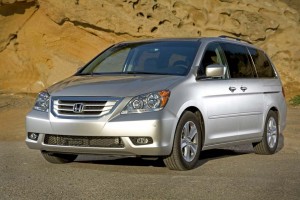Just days after ordering a recall to fix problems with more than 140,000 of its subcompact Fit model, Honda is again under the microscope as federal regulators investigate potential problems that could cause the brakes on nearly 350,000 Honda Odyssey minivans to apply on their own.
The Japanese automaker has already recalled nearly 2 million vehicles so far this year and though it remains to be seen if the new investigation will lead to yet another safety-related service action, Honda already recalled 180,000 vehicles this year due to braking problems.
According to the National Highway Traffic Safety Administration, it launched the latest investigation involving 343,000 Honda Odyssey minivans produced during the 2007 and 2008 model-years after receiving 22 complaints of unexpected braking. According to some owners, the vehicles suddenly slowed by as much as 30 miles per hour even though they tried to accelerate.
In about half of those instances, dealers could find no reports of trouble. But NHTSA reports that in five cases, service technicians were able to link the problem to a trouble code indicating a problem with the minivans’ steering angle sensor. Those sensors make it possible – when operating properly – for anti-lock brake and electronic stability control systems to function.
(Honda recalls nearly 150,000 Fit subcompacts due to fire hazard. Click Here for that story.)
It remains to be seen if the problem is related to the faulty VSA system – the Japanese maker’s term for stability control – that led to a recall of 180,000 Honda and Acura models that were recalled in the U.S. last March. Another 70,000 were recalled in other parts of the world.
So far, there have been reports of crashes or injuries related to the Honda Odyssey braking problem but the Detroit News reported that one owner filed a complaint involving a near miss while traveling on the freeway.
“My Odyssey minivan started to brake on its own,” the owner reported, adding, “I had just picked up my two-year-old from preschool and I had my 10-month-old rear facing as well. If there was something I could have done, I would have. I hit my flashers and pulled over, but like I said I was on the freeway and I felt like a sitting duck with my babies in the back.”
(Honda recalls nearly 150,000 vehicles due to brake defect. Click Here for more.)
It remains to be seen whether the latest investigation will lead to a recall or less severe service action for Honda, but it could add to the headaches the maker has faced in recent months. Traditionally known for high quality, Honda has faced a growing problem with safety-related recalls. It was first or second on the list in terms of total vehicles recalled in the U.S. market for the last five years.
Just last Friday Honda announced the recall of 143,000 Fit subcompacts due to the risk of a short-circuit or fire involving defective master power window switches. The same 2007-2008 vehicles were recalled in January 2010. The maker said the earlier fix actually did not resolve the problem.
As with other makers, part of Honda’s problem is that basic components, such as sensors, microprocessors and switches are often shared by a wide variety of vehicles. That can lead to massive recalls, if parts prove defective, impacting a large number of different models.
But Honda’s problems have involved a variety of different issues this year, including faulty brakes, short-circuiting switches and defective airbag modules. For the year-to-date, the maker has recalled about 1.8 million vehicles in the U.S. alone.
(Jeep recall smaller than initially demanded by feds. Click Here to find out why.)


It’s interesting that Honda and Toyota had almost no recalls in prior years and they were considered supremely engineered and built autos. Some of that may have been perception and not reality however.